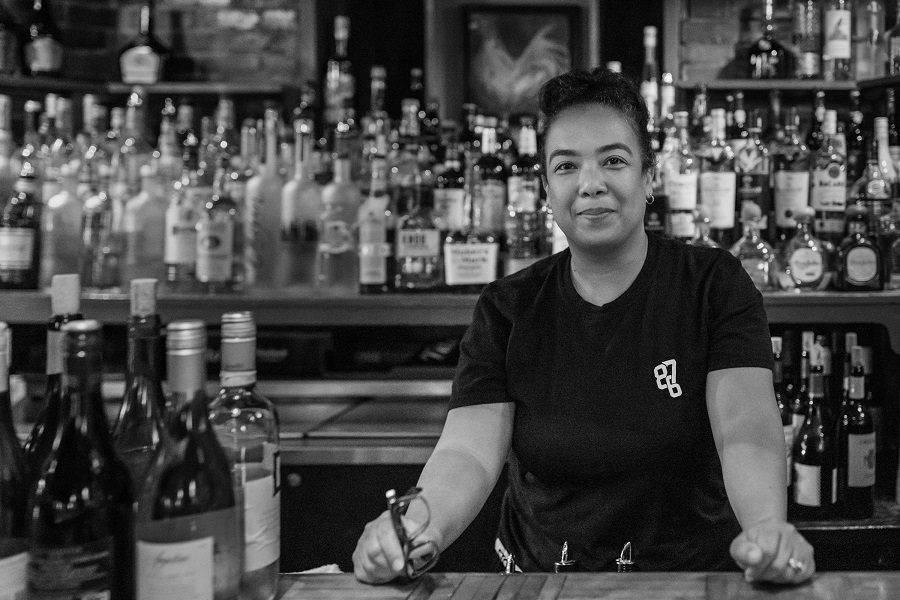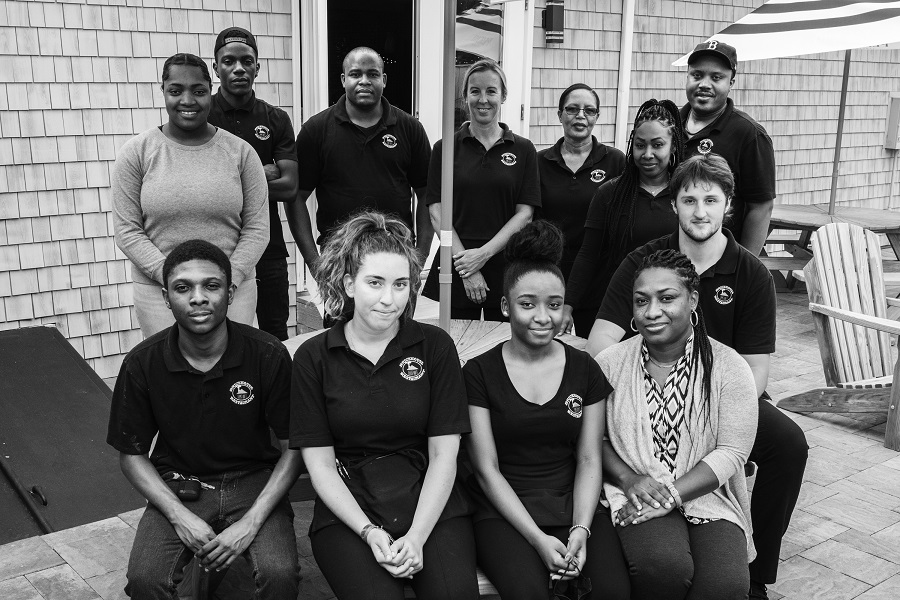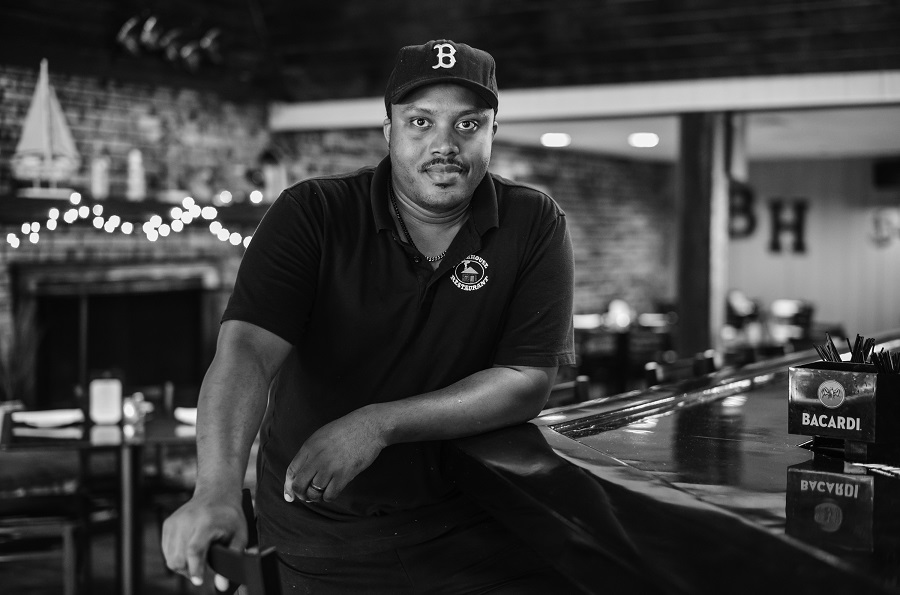PROVINCETOWN — When Omar Neil first arrived on the Outer Cape in 2001, he shared a three-bedroom house with 19 other Jamaican temporary visa holders.
Every day, a truck picked them all up in the morning, took them to Provincetown to work, and returned them to Truro that night. They paid rent and utilities to their employers (who were also their landlords) and even for the gas for the truck.
Earlier that year, before he left Jamaica, Omar and his wife, Marianella Neil, had their first child, Xavier. The following year, Marianella and Xavier joined Omar on the Cape, and the two parents ended up working at the Red Inn.
Now, after 20 years laboring in Provincetown restaurants, inns, and shops, Omar and Marianella have moved from the back of the house to the front. In fact, last year, they bought the house — they own Front Street, one of Commercial Street’s top-shelf restaurants.

“We saw an opportunity, and we decided to take a chance,” Omar said.
“We wanted something for ourselves,” Marianella added.
The Neils are among a handful of Jamaican immigrants on the Outer Cape who, after decades of hard, low-paid work, have managed to purchase their own businesses here.
Clifford and Amelia Harvey have done it; they bought the Brickhouse restaurant in Eastham in 2018. Clifford worked his way up from salads to sous chef during his 11 years in Provincetown kitchens.
Mario Washington bought Cool Runnings Refrigeration in Eastham from his former boss, Joe Trovato, in 2017. Natessa Brown is the owner of Irie Eats on Shank Painter Road in Provincetown. There are a few more, like Jason Swaby, of Swaby Construction in Brewster, and the extended family of the late Danville Brown, who now own One Love Café in Provincetown.
But they are a small fraction of the hundreds of Jamaicans who have been coming to the Outer Cape since the H-2B visa program was created for temporary workers in 1986. The local tourist economy now depends on them.
Out of Sight, Sharp of Mind
The Neils realized their dream of owning their own restaurant in a world where Jamaicans tend to be kept out of sight — in kitchens, not dining rooms. If they are treated unfairly, they do not often speak freely about it.
“I don’t want to say it is racism,” said Omar Neil. “But the reality is, we were brought here to work in the back of the house, to cook and to clean…. The business owners want the staff to look like their customers.”
Immigrant workers send most of what they earn here home to support their families, and therefore cannot risk losing their jobs by complaining about unfair practices, said Sandra Faiman-Silva, professor emerita of anthropology at Bridgewater State University, who has studied Provincetown’s economy.
Several Jamaicans interviewed for this article said they had been passed over for more lucrative positions, even after years of employment. They watched as Americans and other immigrants who were white got promoted.
“I have seen it myself — that happened to me,” said Carlene Brown, who has spent 30 years working mostly in Provincetown and who runs the Chapel on the Pond in North Truro with her husband, Pastor David Brown.
Since waiters and bartenders — the most visible employees — tend to earn the most money in restaurants, that is one way the Jamaican community has been held back.

The Neils and the Browns are optimistic, ambitious people. They came here by choice, because they could earn more money here than is possible in Jamaica. About 2.9 million people live in Jamaica, according to the World Bank, while an estimated one million Jamaicans live in the United States, according to the U.S. Census.
Every business from Provincetown to Hyannis has a Jamaican in it, said Carlene Brown. “They are very dependable, because they are just here to work,” she said.
“We are ambitious, and we do not give up,” said Pastor Brown.
David Brown arrived with one of first Jamaican contingents, who came in 1992 to work at the Lobster Pot under the H-2B visa program. The workers put up with long hours and substandard housing because it is worth it for them.
The Browns have raised their four children traveling between Provincetown and Jamaica. The youngest, Shelice Brown, just graduated from Brandeis University.
H-2B visa holders can obtain green cards, allowing them to work and live in the U.S. year-round if they have a family member with U.S. citizenship or an employer that sponsors them, according to the Mashpee immigration law firm Ferreira & Vasques.
But getting to that point is not easy.
Coming to a new country and not understanding the rules or the culture, the Browns learned the pitfalls — one being that your employer is your landlord. If you arrive in April, and the season does not start until June, there are months when you have rent to pay without much income. Brown said there were weeks he cleared only $5 after paying all his expenses.
That is why Jamaicans often work two or three jobs — one for expenses and the others to save money, David Brown said.
Refusing to Give Up
For years, the Neils each held down two or three jobs, working seven days a week, Omar said. He cooked at the Red Inn for eight years, and Marianella did housekeeping. She also worked at the Little Red Store.
In 2016, the couple had saved enough to buy Norma Glamps, a card and gift shop on Commercial Street. Marianella ran it while Omar became a chef at Ross’ Grill. That same year, they left the basement apartment they had been renting on Nelson Avenue since 2008 and bought a house in Eastham.
In 2019, Front Street’s longtime owners, Donna Aliperti and Kathy Cotter, hired Omar Neil as their chef. “They told us the restaurant was for sale,” he said. “They gave us their recipes and taught us everything.”
In April 2020, a month into the coronavirus pandemic, their liquor license was approved and the sale was completed. But the 74-seat restaurant could offer only seven outdoor tables and takeout in the 2020 season. The Neils did not qualify for disaster relief because they were a new business that had not yet opened. They may not have made it without Aliperti’s and Cotter’s kindness, Omar Neil said. “We could not have done it without help from friends,” he added.
The Neils plan to keep Front Street mostly as it has been for 30 years. During a recent interview, the reservation phone rang nonstop.
In It to Hit It
At the Brickhouse in Eastham, the front of the house is not all white. Cliff Harvey’s mom waits tables. Amelia Harvey runs the bar. Their 14-year-old daughter does everything but serve alcohol. And the kitchen staff is not all Black.
“I want to change that whole thing,” Cliff Harvey said. “Everyone should be together.”
The biggest problem the Harveys have is hiring staff. “Some people think working for a Jamaican is not going to work out,” said Amelia Harvey. “The main thing is, Jamaicans are smart. Just because we are from a small island, it doesn’t mean we are not smart.”
Amelia and Clifford Harvey put everything they had into the Brickhouse. “It was hit or miss for a while, but we were in it to hit it,” said Amelia.
The day before their May 11, 2018 opening, Clifford, who is 36, had to cash in a $1 scratch ticket to pay for a 97-cent item at Ace Hardware.
“We took a big risk,” he said. “I was totally broke. I had maxed out every credit card.”
But almost from the beginning, the restaurant has been a success, he said.
Like Omar Neil, Clifford Harvey worked in Provincetown restaurants for years. Amelia, who immigrated to Florida as a child, was a medical assistant. The couple owns a home in Truro.
“We have a motto in our home,” said Amelia, 36. “Everything we have, we worked hard for it.”
These are success stories, but they were hard won. The Jamaican community here faces “astronomically impossible housing costs,” unscrupulous landlords, a need for help navigating services, and inadequate public transportation, said Donna Walker, an organizer who helped persuade Provincetown voters to approve a $136,000 office of diversity, equity, and inclusion (DEI) in May.

A lot of planners are helping to form the DEI office, but Jamaicans are not among them, said Walker, an admissions counselor at Cape Cod Community College. She has tried.
“We want them to be empowered to speak up,” Walker said, adding that strong resistance comes from feeling their voices don’t matter.
As business owners, of course, they have a different platform from which to speak. But restaurant ownership takes its own toll: the Neils work six days a week, 12 hours a day, leaving little time for civic engagement. They are used to it, having worked that hard for other people.
“You have to refuse to give up,” said Omar Neil, “no matter what.”
Editor’s note: Because of a copy editing error, the print version of this article dated Aug. 12, 2021 incorrectly stated that the Neils had raised four children; it is David and Carlene Brown who have four children.



